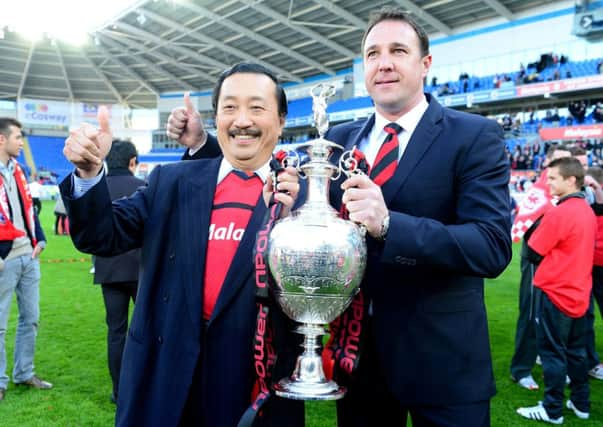Fans and media take the brunt with obtrusive attitude of clubs


However, with football becoming a business rather than a sport, their narcissism and hunger for financial gratification simply manifests the selfish and unscrupulous behavioural traits of many clubs in the modern day.
Shamefully, we as football fans, including local media outlets, are the pawns in this increasingly frustrating saga. There’s no ‘Community Chest’ in this game, more a ‘Personal Chest’ with directives such as ‘Hike ticket prices, collect profits’, ‘Change kit again, count income’ or ‘Globalise club, ignore local support, reap rewards’.
Advertisement
Hide AdAdvertisement
Hide AdThe larger than life businessmen at Cardiff City and Hull City aren’t the only guilty party, but they are the embodiment of this generation of greed. They are the leaders of a cultural change that is pricing out and ostracising even the most dedicated supporters. As a result of this financial muscle, clubs are distancing themselves from the community that has provided the lifeblood of their existence for decades upon decades.
A new breed of director emerged following the FA’s decision in 1982 to rescind the infamous regulation limiting shareholders’ dividends to 7.5 per cent. It’s here, as author Matthew Taylor cites in ‘The Association Game: A History of British Football’, that the entrepreneurial governance of Irving Scholar, Martin Edwards and David Dein became prominent at Tottenham Hotspur, Manchester United and Arsenal respectively.
He claims that these ‘new directors’ rejected the ‘traditional’ view of football as a ‘peculiar’ business in which the club was run as a public utility rather than a profit-making venture. Football, for these men, was primarily a business: their main goal became the pursuit of profit through the commodofication of the game.
That English ownership continued with Alan Sugar, Peter Johnson and Jack Walker who booked the trend just prior to the lucrative marriage of Sky Sports and the Premier League. But it wasn’t until July 2003, with Roman Abromovich’s purchase of Chelsea, that a significant shift to foreign ownership came to fruition. The Glazer family followed at Old Trafford and then the mega-rich Abu Dhabi United Group confirmed the takeover of Manchester City in 2008. Now the foreign invasion has become all too familiar.
Advertisement
Hide AdAdvertisement
Hide AdTan and Allam have all the traits of NPD, a personality disorder. They appear excessively preoccupied with personal adequacy, power, prestige and vanity. After exerting his superiority to rid manager Malky Mackay of his duties, Tan has shown that money speaks louder than tradition as he bids to alter an identity that has spanned a century.
He’s instigated a colour change from blue to red, something that could one day sweep the Cardiff City Stadium, and introduced a red dragon to accompany the bluebird on the club’s badge. A name change, with Cardiff Dragons a repetitive suggestion, could also be in the pipeline in hope of reaching a wider, more global audience, to make the club more marketable.
Meanwhile, Allam is intent on rebranding Hull City, a name they’ve held since 1904. With merchandise sales on the mind, Allam proposes to Americanise the football club by applying animalistic traits with the name Hull Tigers, again to boost the club’s appeal commercially in international markets. It’s almost as if Allam looks at City’s history with irrelevance. The pair should be locked in a makeshift cell and forced to roll a double before being released back in to play.
The actions of other, less conspicuous, chiefs have also affected football fans with the banning of the local media. Newspapers, and other sources, have provided information, conversation fodder, and support for football clubs at every level of the pyramid. Reporters are usually loyal, dedicated and enthusiastic fans, which sometimes makes the treatment bestowed on them even more unforgivable. It’s petty, shameful bullying.
Advertisement
Hide AdAdvertisement
Hide AdThe local media is the umbilical cord that keeps fans connected to their clubs. They are indispensable, democratic allies, who often burn the midnight oil to keep fans updated. But that doesn’t matter to the likes of Newcastle United, Port Vale, Nottingham Forest, Southampton and Crawley, among others, who all denied access to certain media outlets.
And that obviously works in to the hands of clubs, who now demand the limelight for themselves. Media departments were once avenues that worked in unison with local press, providing information to share in public spheres. Now, in the digital age, carried by the phenomenon of the internet, they’re more concerned with sealing ‘exclusives’ for their own websites which comes with a subscription fee for fans. Everything is now done in-house, with the press slowly becoming surplus to requirements. The power of clubs ensures that they’re not reliant on the press anymore and although they claim to be ‘community-minded’ clubs, these bans are ultimately hitting the revenues of local publishers.
That’s why ‘Mixed Zones’ are now cautiously guarded. There’s no freedom of speech for players with club representatives fearful that they might divulge something considered to be ‘news worthy’. The Mixed Zone is a ‘No Man’s Land’ where players dodge the bullet, under the militant protection of media officers, who want the ‘scoop’ for their own usage. It’s all very regimental now.
Compare that to the NFL in America where the press have open access to players dressing room, invited to speak to whoever they wish. In fact, just recently Seattle Seahawks running back Marshawn Lynch was fined $50,000 for violating the league’s media policy. That certainly puts thing s in to perspective over here.
For me, there’s plenty wrong structurally in England’s hierarchy. And at the end of the day it’s the fans and the local communities that are being punished.